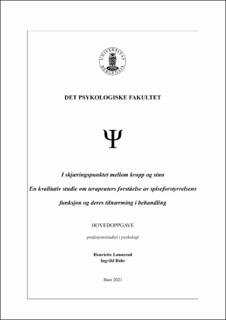| dc.contributor.author | Lønnerød, Henriette | |
| dc.contributor.author | Bahr, Ingvild | |
| dc.date.accessioned | 2022-01-14T07:39:58Z | |
| dc.date.available | 2022-01-14T07:39:58Z | |
| dc.date.issued | 2021-12-15 | |
| dc.date.submitted | 2022-01-13T23:00:27Z | |
| dc.identifier.uri | https://hdl.handle.net/11250/2837377 | |
| dc.description.abstract | Formålet med vår kvalitative studie var å undersøke hvilken funksjon terapeuter opplever at spiseforstyrrelser fyller hos pasienter, og hvordan de jobber med å erstatte funksjonen til spiseforstyrrelser i behandling. Vi intervjuet 14 terapeuter med ulike arbeidskontekster og teoretiske tilnærminger ved bruk av semistrukturert intervju. Datamaterialet ble analysert med bruk av refleksiv tematisk analyse. Gjennom analyseprosessen kom vi frem til følgende hovedtema: 1) Jobbe terapeutisk for å redusere behovet for beskyttelse, 2) Anvende terapeutisk relasjon for å styrke pasientens relasjon til andre og 3) Bryte spiseforstyrrelsens selvopprettholdende spiral. Funnene viste et skille blant terapeutene i deres forståelse av spiseforstyrrelsens funksjon. Noen oppfattet at spiseforstyrrelsen har en tydelig funksjon, mens andre opplevde at den ikke nødvendigvis har en funksjon, og at spiseforstyrrelser har utviklet seg mer tilfeldig. Funnene belyste også en variasjon i hvilket fokus terapeutene vektla i behandling. Noen terapeuter jobbet hovedsakelig med å redusere symptomer som har bidratt til å opprettholde spiseforstyrrelsen, mens andre fokuserte mer på faktorer i individet og omgivelsene som har bidratt til å utløse spiseforstyrrelsen. Vi har diskutert våre funn i lys av eksisterende forskning og teori på feltet, drøftet begrensninger ved studien og fremhevet implikasjoner for klinisk praksis og videre forskning. | |
| dc.description.abstract | The purpose of our qualitative study was to investigate what therapists experience as the underlying function of eating disorders, and how they work to replace the function in treatment. We interviewed 14 therapists with different work contexts and theoretical approaches using a semi-structured interview. The data material was analyzed using reflexive thematic analysis. The process of analysis resulted in the construction of the following main themes: 1) Working therapeutically to reduce the need for protection, 2) Applying the therapeutic relationship to strengthen the patient’s relationship to others and 3) Breaking the eating disorder’s self-sustaining spiral. The findings showed a difference among the therapists in their understanding of the function of eating disorders. Some considered the eating disorder to have an evident function, while others experienced that it didn’t necessarily have a function, and that eating disorders developed more randomly. The findings also highlighted a variation in what the therapists focused on in treatment. Some therapists mainly worked to reduce symptoms that contributed to maintaining the eating disorder, while others focused more on underlying factors in the individual and the environment that have contributed to triggering the development of the eating disorder. We have discussed our findings in the light of existing research and theory in the field, considered limitations in the study and highlighted implications for clinical practice and further research. | |
| dc.language.iso | nob | |
| dc.publisher | The University of Bergen | |
| dc.rights | Copyright the Author. All rights reserved | |
| dc.title | I skjæringspunktet mellom kropp og sinn- En kvalitativ studie om terapeuters forståelse av spiseforstyrrelsens funksjon og deres tilnærming i behandling | |
| dc.type | Master thesis | |
| dc.date.updated | 2022-01-13T23:00:27Z | |
| dc.rights.holder | Copyright the Author. All rights reserved | |
| dc.description.degree | Hovedoppgave psykologprogrammet | |
| dc.description.localcode | PROPSY317 | |
| dc.description.localcode | PRPSYK | |
| dc.subject.nus | 736102 | |
| fs.subjectcode | PROPSY317 | |
| fs.unitcode | 17-0-0 | |
